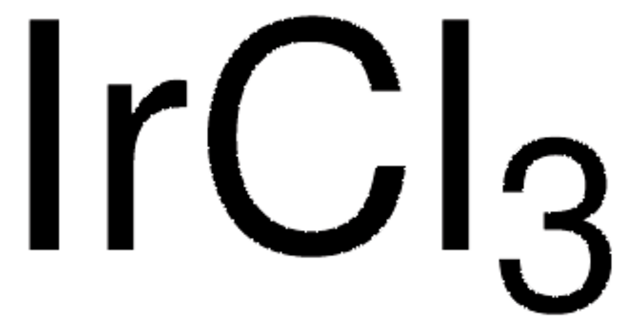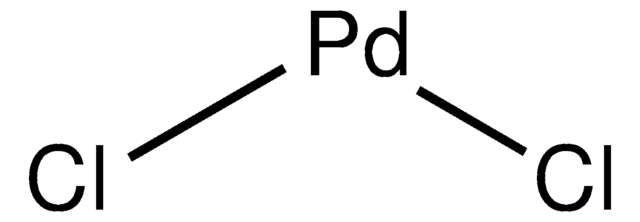203491
Iridium(III) chloride hydrate
99.9% trace metals basis
Synonym(s):
Iridium trichloride hydrate
About This Item
Recommended Products
Quality Level
Assay
99.9% trace metals basis
form
crystals and lumps
reaction suitability
reagent type: catalyst
core: iridium
impurities
≤1500.0 ppm Trace Metal Analysis
density
5.3 g/mL at 25 °C (lit.)
SMILES string
[H]O[H].Cl[Ir](Cl)Cl
InChI
1S/3ClH.Ir.H2O/h3*1H;;1H2/q;;;+3;/p-3
InChI key
MJRFDVWKTFJAPF-UHFFFAOYSA-K
Looking for similar products? Visit Product Comparison Guide
General description
Application
- As a precursor to synthesize IrO2 nanofibrous catalyst for oxygen evolution reaction.
- As a starting material to prepare Ir complex that acts as an additive to hole transport layer in perovskite solar cells. This Ir complex helps to reduce recombination rate and enhances the stability of solar cells.
- To fabricate thin and highly active IrO2 anodes for proton exchange membrane electrolyzer cells (PEMECs).
- As a precursor to synthesize ionic Ir metal complexes for efficient flexible green light-emitting electrochemical cells. This leads to enhanced quantum efficiency and luminescence.
Signal Word
Warning
Hazard Statements
Precautionary Statements
Hazard Classifications
Eye Irrit. 2
Storage Class Code
11 - Combustible Solids
WGK
WGK 3
Flash Point(F)
Not applicable
Flash Point(C)
Not applicable
Personal Protective Equipment
Choose from one of the most recent versions:
Already Own This Product?
Find documentation for the products that you have recently purchased in the Document Library.
Customers Also Viewed
Articles
Plasmonic nanoparticles have unique optical properties that can be tailored to suit a variety of applications in the biotechnology1–8 and electronics9–16 industries.
Our team of scientists has experience in all areas of research including Life Science, Material Science, Chemical Synthesis, Chromatography, Analytical and many others.
Contact Technical Service










